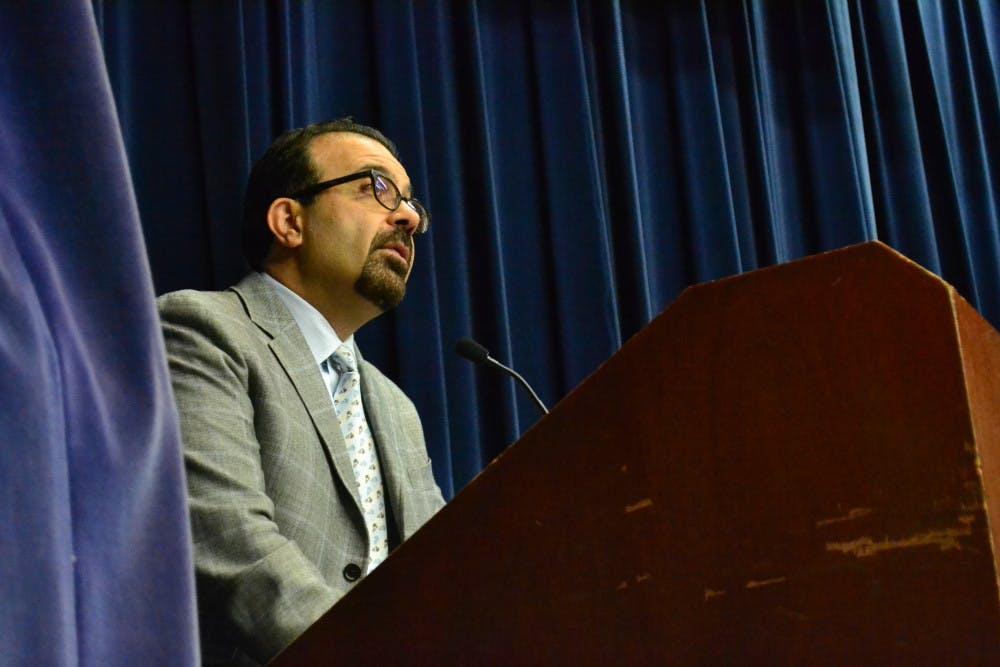This past Thursday, the student group Justice for Palestine (JFP) hosted Associate Professor of Modern Arab Politics and Intellectual History at Columbia University Joseph Massad, who spoke on the contentious subject of Zionism and the Palestinian “right to return.”
Although this marked his second lecturing visit to the College — his last was in April 2011 — Massad’s return was not welcomed by all members of the student body.
On April 9, two days prior to Massad’s arrival, members of JFP received an email from Harry Zieve Cohen’s ’15 account, co-signed by 12 other students, which reiterated a request from two months before to articulate their opposition to Massad’s visit to campus. They framed Massad’s views on Jews and the LGBTQ community as more than a difference of opinion, calling them highly offensive. The group explained that while they recognized JFP’s right to bring whomever they desired to speak, especially one with a strong pro-Palestinian stance, they questioned specifically the sense in extending an invitation to someone touting anti-Jewish positions.
“We wanted to make sure … our concerns were known, because I would want the same to be done if I were bringing a speaker who said false things that were offensive to a group of people,” said Zieve Cohen.
On April 10, JFP member and one of the email’s recipients Amitai Ben-Abba ’15.5 responded to the complainants with his personal perspective, describing the group’s interpretation of Massad’s positions as misconstrued and unfounded. In terms of its accusations that Massad is anti-Semitic, he wrote, “I [] find it extremely offensive that you’re accusing of anti-Semitism a person who’s actively calling out against anti-Semitism. Calls against the ethnocratic State of Israel as one that is founded on racist axioms (the oxymoron of “Jewish Democratic,” for instance) are not anti-Semitic. Anti-Zionism is not anti-Semitism.”
Ben-Abba then emphasized that he too had grown up with pro-Israel rhetoric but has pushed through the feelings of discomfort that came from challenging his education to discover the reality of the situation.
On April 11, Massad addressed a fairly crowded Dana Auditorium. For the most part, his speech was a history of Zionism from the perspective of an anti-Zionist. He immediately identified his position, arguing that the central objective of Zionism, from its birth in the early 20th century, has been to expel the natives from the land now under Israeli administration. He frequently condemned the creation and development of Israel as an imperialist exercise, selecting passages from early Zionists, which indicate that the masterminds behind the first settlements believed Jews could not integrate into a state of mixed faith. In terms of the “right of return,” Massad denounced Israel’s 1950s law, which since its institution presents any Jew that immigrates to Israel citizenship, arguing that research defies the Zionist conception that all Jews, particularly European Jews, are descendants of the ancient Hebrews that originally resided in the area.
Massad then compared the “law of return” with Israel’s historic policy, which rejects Palestinians in refugee camps and the Occupied Territories the right of return, even those, for example, that still hold deeds to property in Israel. He referenced a remark from the first prime minister of Israel who apparently hoped “the old [Palestinians] would die and the young would forget.” He refers to the perpetuation of this policy along with the Israeli occupation as apartheid, referencing oppressive policies administered by the white minority government of South Africa for much of the 20th century.
During the question-and-answer session, individuals who disagreed with Massad’s position were given the opportunity to confront him. David Imber ’13 asked Massad how he could reconcile the “deeply offensive, historically false statements that you make regarding the fictional creation of Jews, [which] represent a shallow retributive sense of justice that you claim Israelis do unto Palestinians,” with the goal of peace and a just solution between Israel and Palestine.
Massad’s response was lengthy and unabashedly defended his positions.
“The issue is not about understanding,” he said. “The issue between white and black South Africans was not about a misunderstanding. Slavery in the U.S. was not about misunderstanding between blacks and whites. … There are violations of international law and racist laws … the goal is to establish justice and non-racial justice … the goal is equal citizenship, not understanding.”
Zieve Cohen felt the lecture affirmed his concerns regarding Massad’s suitability as a speaker at the College.
“It’s a complicated situation; he gave a very simplistic account that, frankly, isn’t respectful of Middlebury students,” he said. “Middlebury students are intelligent — they deserve to hear the true, really complicated story. This isn’t a black or white issue.”
At the same time, Middlebury alum and JFP supporter Jay Saper ’12.5 identified a conundrum in asking for a neutral presentation of facts that supports an academic environment, when the academic environment in which we reside is inherently biased.
“All words, all talk, all beings are inherently political, and Middlebury as a community has a strong stance,” he said. “That we had so much institutional support behind these last lectures [for example, Dennis Ross] … speaks very strongly of what this stance is.”
Despite the back-and-forth between JFP and signers of the April 9 email, members of both groups expressed that despite the divisiveness of the issue the conflict has remained respectful.
Meanwhile, students are in the process of forming a new group, Middlebury Forum for Israel, to provide a place for fair discussion of Israel within the broader Middle East context.
__
This article was edited on 4/18/2013 to reflect the following correction: The original version stated that the students are forming the Middlebury Forum for Israel in response to JFP; however, the group has been in the planning stages since December and is not a direct response to JFP.
Anti-Zionist Lecturer Invites Controversy

Comments


